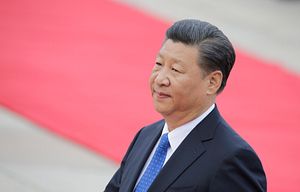The Chinese Communist Party (CCP) will soon embark on its own “Game of Thrones” as delegates gather for its 19th National Congress in Beijing. A variety of posts will be filled for the next five years – including the vitally important General Secretary of the CCP (President of the People’s Republic of China or PRC), as well as members of the Standing Committee (roughly akin to the UK Cabinet). These individuals will find themselves leading a massive organization, which has more than 80 million members, and running what is arguably the world’s largest economy. They will wield considerable powers but the incumbent leader is unlikely to relinquish his grip on power. So what should we look out for?
1. Xi Jinping’s ambition
Since becoming the party’s General Secretary in 2012 (and therefore President of the PRC), Xi Jinping has consolidated his position. At the heart of this has been the anti-corruption drive. To Xi’s supporters, this represents the General Secretary’s earnest desire to rid the party of impure elements that undermine the party’s legitimacy.
In contrast, critics say that this drive is a front to remove opponents and to consolidate his power. Whatever the truth, it is virtually certain that Xi will be returned as General Secretary for another five years.
In addition, Xi will surely retain his chairmanship of the Central Military Commission – thereby exercising significant influence over the armed forces. But there are rumors that Xi intends to extend his influence beyond five years. If so, this represents a significant departure from the gradual institutionalization of Chinese politics.
Since the 1990s, CCP General Secretaries have generally served only two terms (Zhang Zemin was elected in 1992 and 1997 – although he had become General Secretary slightly earlier in 1989 as part of the Tiananmen re-shuffle – and Hu Jintao was elected in 2002 and 2007). If Xi tries to prolong his influence, this may indicate a return to the more personalized politics of the 1960s, 1970s and 1980s.
2. The age double standard
Even if Xi “Da Da” (“Father/Uncle Xi”) emerges with enhanced prestige following the 19th congress, a complete return to the Maoist personality cult depicted in propaganda posters of the 1960s and 1970s seems unlikely. The Chinese Communist Party is not monolithic and is comprised of different factions, such as the Shanghai gang, the Communist Youth League and the Princelings. To make matters more complicated, there is also overlap between these groups. Nevertheless, the National Congress – and hence the election of CCP officers – will indicate which groups are ascendant or in retreat.
Who serves on the Standing Committee also matters. It is widely expected that because most of the current Standing Committee are aged in their late 60s, there will be a high turnover of its membership this autumn. Recent convention suggests that if candidates are over 68, they will be retired.
This age restriction does not apply to Xi or Chinese “prime minister” Li Keqiang as both are in their early 60s (and both serve on the Standing Committee). But there are suggestions that Xi’s anti-corruption manager, Wang Qishan, may stay on – even though he is 68. If Wang continues on the Standing Committee, this would symbolize Xi’s power.
3. The power of former leaders
Another telling development will be the ability of former presidents to anoint future presidents. China’s “paramount leader” during the 1980s, Deng Xiaoping, helped ensure that Hu Jinto succeeded Jiang Zemin in 2002. For his part, Jiang was instrumental in Xi’s rise to power after Hu in 2012. Given this precedent, one might expect Hu to secure the promotion of one of his protégés to the Standing Committee later this year in the hope that this candidate will succeed Xi in 2022. It remains to be seen if Hu has sufficient clout.
4. The challenges ahead
On a recent visit to China, I was struck by the pace of change, including high speed trains and the purchasing of goods by mobile phones (not cash). Yet for all these technological developments, there are still significant challenges for China: rural poverty, environmental degradation and the economic turbulence generated by the “new normal” –China is now transitioning from export-led economic growth to consumer-driven growth.
The Xi-Li administration has sought to tackle these problems as part of the “Chinese Dream” – or national “rejuvenation” – which aspires to attain a “moderately prosperous society”. We will see this autumn how far the party judges the Chinese Dream to have been realized.
5. Foreign policy and North Korea
We may also gain insight into China’s foreign policy for the next five years. Recently, China’s neighbors have been unnerved by territorial disputes in the South China Sea and by the steady advance of the PRC’s military. Again, the shuffling of personnel and speeches at the National Congress may indicate where the PRC sees itself going. Will it become a regional or global power? Will China be an economic, military or diplomatic player?
![]() A potential test case is the current standoff between the US and North Korea. Nobody knows how this situation will develop – in late August, North Korea fired a missile over Japan. But given the close proximity of the Korean peninsula to China, one can bet that Beijing will be monitoring the situation closely. One thing is for sure, China’s leaders will have a full in-tray when they go back to work.
A potential test case is the current standoff between the US and North Korea. Nobody knows how this situation will develop – in late August, North Korea fired a missile over Japan. But given the close proximity of the Korean peninsula to China, one can bet that Beijing will be monitoring the situation closely. One thing is for sure, China’s leaders will have a full in-tray when they go back to work.
Simon Hill, is a visiting lecturer and research associate at the University of Chester.
This article was originally published on The Conversation. Read the original article.

































